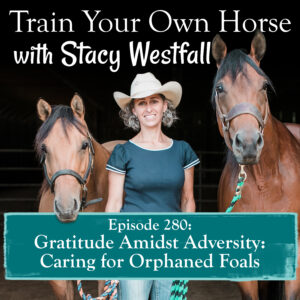Episode 280: Gratitude Amidst Adversity: Caring for Orphaned Foals

Stacy Westfall shares a deeply personal journey of unexpected challenges and gratitude in her latest podcast episode. Following the sudden loss of her husband’s mare Lucy, who left behind a ten-day-old foal named Lefty, Stacy found herself unexpectedly caring for two orphaned foals. She adopted another foal, Stormy, from Last Chance Corral to raise alongside Lefty, leading to a whirlwind of emotions and physical demands.
Through this experience, Stacy emphasizes the importance of embracing contrasts in life. Despite the exhaustion and concern of caring for the foals, she finds moments of rest and contentment. Stacy draws parallels between her own emotional resilience and the foals’ physical and mental growth, noting how they stretch their comfort zones and quickly return to a state of equilibrium.
Reflecting on her past experiences, including raising orphan foals in 2016, Stacy expresses gratitude for her preparedness and the resources to care for the foals. She credits her mindset mastery work for enabling her to navigate a range of emotions and embrace the challenges as choices rather than burdens.
Ultimately, Stacy sees caring for the orphaned foals not as an obligation but as an honor and a gift, highlighting the importance of choosing to embrace life’s challenges. She concludes with a message of gratitude and resilience, inviting listeners to visit her website for more resources on horse training and success.
SUBSCRIBE TO THE PODCAST HERE:





YOURS FREE
WHY IS MY HORSE...?

